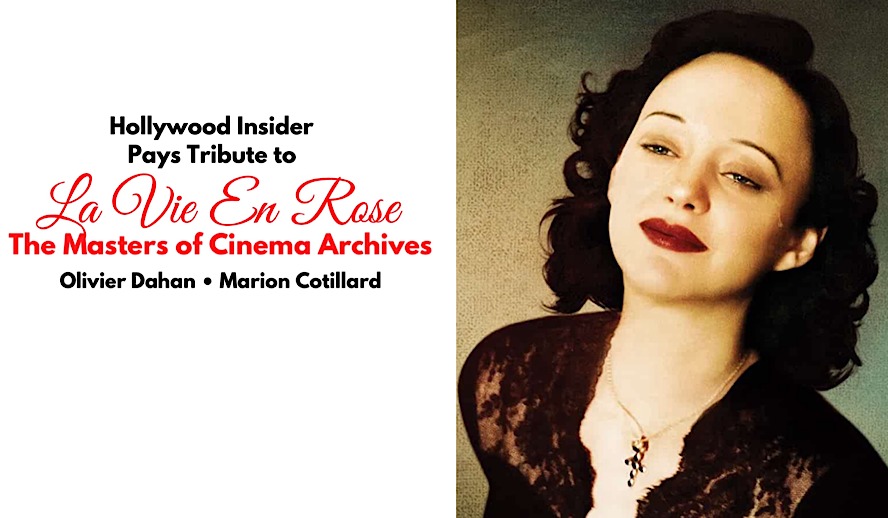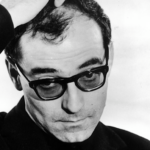Table of Contents

Photo: ‘La Vie En Rose’/Icon Film Distribution
With the utmost respect, Hollywood Insider would like to announce that we are paying tribute to Olivier Dahan’s Marion Cotillard-starring masterpiece ‘La Vie En Rose’ with its inclusion in The Masters of Cinema Archives. The archives are devoted entirely to the greatest cinematic masterpieces chosen by a team of curators led by Pritan Ambroase, the CEO and editor-in-chief of Hollywood Insider. The Masters of Cinema Archives shines a light on films that prove the power of Cinema to elevate and transmute us. Additionally, this film is also included in Hollywood Insider’s Hidden Gems Series with which we aim to bring forth and highlight great international film directors and their Cinema that must be watched from across the one-inch barrier of subtitles.
What makes a film a masterpiece is frustratingly ambiguous. Is it the script that cements a movie as a classic? Is it a director’s vision that captures something previously unseen? Could it be an actor’s transformation that blurs the line of fiction? It’s not specifically clear what it is that elevates a film playing on a screen to a timeless hallmark of culture, but you know it when you see it. A masterpiece is found in a story that follows you home from the theater, plays over and over in your head before bed, and changes the way you think about your life. Olivier Dahan struck that elusive magic in his 2007 classic-turned-masterpiece, La Vie En Rose, a chronicle of the tragic journey of French songstress and musical legend, Édith Piaf. While Piaf’s real-life story supplies enough cinematic heft to be Academy Award-winning in its own right, Marion Cotillard’s powerhouse performance combined with Dahan’s thoughtful and unexpected execution makes La Vie En Rose a spectacle worthy of invoking Piaf’s grand memory.
Related article: Hollywood Insider’s CEO Pritan Ambroase: “The Importance of Venice Film Festival as the Protector of Cinema” – Cinema Will Survive and Thrive
Related article: A Tribute to Leonardo DiCaprio: The Generation Defining Thespian & Hollywood Legend
The Premise of a Masterpiece Based on a Life Story Worthy of Said Masterpiece
La Vie En Rose (2007) is a film on the life of French singer Édith Giovanna Gassion, better known as Édith Piaf. The film follows her journey starting with the grim beginnings in her childhood home in a brothel abandoned by her negligent mother and abusive father and being nannied by members of society that are uncared for – the poetry in this film is sublime. The film shows Piaf facing a wide range of hardships that tormented her throughout life, from the times of her anticipating blindness to the final chapters of her life where she became dependent on drugs. From a child playing in the street while her mother sings for food to a withering woman no longer able to prove her worth through her once undeniable talent, Dahan utilizes both the good and bad of Piaf’s life to create a film that conveys the true spirit and resilience of an artist. The film pays tribute to Piaf’s turbulent life by diving deep into the struggles the singer-songwriter dealt with instead of shying away and attempting to expunge them. By the end of the film, we’ve seen Édith’s triumphs, devastating falls, and most beautifully, her moments of stillness.
This movie is wonderfully elegant, illustriously gleaming, and yet, oh so fading like a rose on fire. Bursting with powerful performance, and genius direction, La Vie En Rose is a golden necklace on a black dress or brown piercing eyes on contrasting skin. The film is the unexpected beauty of the 2000s. The themes Dahan explores through Piaf’s experience are universal: addiction, low self-esteem, and loss (in terms of both death and defeat). La Vie En Rose weaves through the most heart-wrenching and inspiring moments of the life of international treasure, Édith Piaf, spanning from her rise in fame to her inevitable demise. A woman born into a cursed life, Édith was destined to burn out, but Dahan conveys how brightly her star burned giving light throughout the world while it could. Anchored by Marion Cotillard’s mesmerizing performance, La Vie En Rose is a modern classic that stays with audiences long after the film ends, much like the legend of Piaf.
Olivier Dahan spoke exclusively to Hollywood Insider during an interview reminiscing on the film more than a decade after its release. Hollywood Insider questioned Dahan on what it was about Édith Piaf that spoke to him, to which Dahan blissfully remarked, “Everything. During my writing process, I was her… Later, during the filming, Marion became her too. Édith was so true and sincere that we had to be true as she expected us to be. For me, Piaf is the essence of what an artist should be… I love artists. I wrote the film as an homage to them all. When I was a kid in the hospital, I was helped by artists like Springsteen, Bowie, Dylan, Lynch, Scorcese, Jack Kirby, Meryl Streep… all these artists in very different mediums are generous. They give, whatever they struggle with, in their personal life, they still give. I am moved by that.”
Related article: Christopher Nolan’s ‘Inception’: The Decade’s Greatest Film Excels
Related article: A Tribute to Oliver Stone: The Oscar-Winning Hollywood Director & Writer
The Magician, The Auteur, The Maestro of Cinema – Olivier Dahan
While the performances here are nothing shy of spectacular, the film owes its wonder to director Olivier Dahan. A film that was nominated for over a hundred awards, and winning about half of them, it is not controversial to address La Vie En Rose as a masterpiece. As has been made evident, Piaf’s life is reminiscent of a Shakesperian tragedy and is cinematically compelling enough prior to being translated into film. While this is true, the creative execution of the director and co-writer of the film, Olivier Dahan, should not be understated. Just as Piaf did not live what many would consider an average life, La Vie En Rose is not an average film. Rather a case of an extraordinary life story meeting extraordinary Cinema. Dahan directed a movie that is constructed with the purpose of presenting the story’s material as thought-provoking and emotionally enriching as possible. Several creative decisions allow La Vie En Rose to exist beyond the expected cinematic experience such as the non-chronological storytelling as well as scenes in the film that intentionally engage in fantasy. Dahan’s creative direction adds genius to the already enthralling memoir, culminating in a classic film.
By not telling a chronological story, Dahan effectively captures and conveys all of the contradictions of Piaf. One second, Édith is an abandoned child praying for sight, and the next she is the center of attention at an expensive restaurant demanding free champagne. Like solving a blurry puzzle, the arrangement in which events in Piaf’s life are revealed is cleverly decided in order to provide a new piece of understanding, without ever revealing the whole story. Even though this is a film about Piaf, Dahan does not pretend to fully understand her. The non-chronological storytelling speaks to the lack of clarity that surrounds Piaf’s enigmatic character.
Related article: The Power of Positivity: Ikorodu Bois + Chris Hemsworth + Russo Brothers + Sam Hargrave
Hollywood Insider questioned Dahan on what La Vie En Rose means to him after all these years, and he replied with startling revelation stating, “I have never seen this movie since it was released. It’s not a matter of being afraid to see faults that I can not fix anymore – I have to accept them all. Maybe, it’s because, in this film, which tells the story of a female singer born in 1915, I have put a lot of myself and that once finished, the film has become a mirror of myself thus making it difficult for me to watch for, or after, too long? Even though I am slowly forgetting the movie itself, I still keep a lot of memories of my life back then. I started writing the script in Los Angeles, the first 70 pages were written in my hotel room in West Hollywood… I told myself that to write this movie I had to be far from France. So I stayed in this room on my own for weeks, digging into Édith’s life and mine. Later, after 2 years of making and editing, I returned to Los Angeles to present the film. I took the same hotel room. Movies are pieces of life. Each film corresponds to a stage in my life. I remember the welcome I received in Los Angeles, it was very moving. Not just the Oscars, but people in general. Knowing that you are touching people’s hearts is the most important thing. That is what the film means to me after all these years. A piece of my life and my work that still touches people.”
Titine, Saint Therese and Fire – A Constant Rebirth of Love Despite Darkness
Clarity and structure may have been lacking in Piaf’s life but love was in constant abundance and in some form of rebirth. Being abandoned at a brothel, a place devoid of love where only surface-level attention and skin thrive, Piaf encounters her first love in the form of Titine, a prostitute who gave Édith the truest love and the most permanent of gifts – faith in herself. Titine devotedly guides Édith to love and care despite all odds, even nurturing her to pray to Saint Therese in times of darkness – this unbreakable gift from Titine stays with Édith throughout her life.
In a visionary sequence, young Edith saw Saint Therese in the glitter fires of a circus act. She came to her like a spirit guide and was gone just as quickly in a shimmer. Throughout Édith’s life, we see Saint Therese bringing Édith back to light. The first half of the film is curtained in deep shadows, nighttime sequences, and moments of thematic darkness. As the film breathes to the crux of Édith’s life, Saint Therese’s flame too expands like lungs. Her miracles rain like stardust onto Édith’s life, and the film burns at Édith’s heels as we feel her teetering into her trauma breaking from the ground beneath her. It’s these sprinkles of magical fires that bless Édith in her times of immense breaking. Unfortunately, her life can sometimes feel more like fanning embers than a raging inferno. Édith’s life is a metaphor for rebirth and rediscovering strength.
Hollywood Insider inquired and beckoned Dahan to tell us what inspired him to make this film and to this, the director wisely responded, “I grew up in a hospital. Since the age of 6, I have suffered from an autoimmune disease which should have prevented me from living normally and certainly prevented me from working in any field. At the age of 12, I wanted to make films but the illness was a serious obstacle to this dream. However, I took my father’s Super 8 camera at the time and tried it. My illness was such that I could not stand on my legs without falling. But by putting my back against a wall, it was possible, I could stand up and film. Then, I had to find a way to stand up while telling a story. In a way, it still is. When I became interested in the life of Édith Piaf, I found a lot of things that spoke to me. The ability to do your “art” despite physical problems, sometimes despite body pain. It was something she had to deal with. When I wrote the screenplay, this theme was at the heart of the matter. How an artist puts himself in danger and overcomes his fears, illness, disability, and all obstacles, to “produce” something real and personal. Édith was a perfect example to make visible and cinematographic what I wanted to express.”
Marion Cotillard or Marion the Lionheart
Marion Cotillard. That is it. That name alone has come to signify brilliance. The golden facet of La Vie En Rose that contributes to its status as a masterpiece is Marion Cotillard’s performance as Édith Piaf which went on to deservedly award her an Oscar for Best Actress. An undeniable and unprecedented triumph, Cotillard renders herself unrecognizable as she essentially becomes Piaf both spiritually and physically. Cotillard delivers a lionheart performance, unbelievably taking on the role of Piaf from a teenage girl to a dying adult. Cotillard not only resembles Piaf in all of her stages of life, but she also evokes all of the divergent personalities of a woman living a life of poverty, wealth, and illness. Some of her most magnificent work is her playing age; her engagement into Édith’s crippled physicality is truly magical to witness as she plays three completely distinct phases of Édith, that all carry the exact same essence from start to finish. Although Cotillard plays Édith in phases of entire decades, the core values of Édith shine through. As all of the abhorrent events of the film transpire, it is Cotillard’s magnetic performance that makes the gory movie so alluring and borderline inescapable.
Cotillard never loses Édith’s girlish nature, even in her moments of brutishness, like an ocean breeze in New York City, there’s a glint of mysterious fortitude, something magical hidden up her sleeve. Even as Édith unravels in the wake of the film’s most fiery catastrophe, her youthful charm is still an emotional ballad away. The compassion Cotillard has for Piaf is unmistakable as it pours into her portrayal and transfers to the audience. Cotillard’s physicality and personality make the viewer understand and empathize with a character that is easy to misconstrue and often difficult to root for. It is this central performance that burrows itself deep inside the viewer’s brain and remains long after the film is over. The raw desperation, excitement, and agony of Piaf’s character are all made readily accessible through Cotillard’s palpable performance from beginning to end.
Related article: A Tribute to Stephen King: The Genius Writer Synonymous with Hollywood Classics
With absolute certainty, Marion Cotillard’s glittering Hollywood career is thanks to Olivier Dahan, the film’s success, and the Academy Award she won for the role, thus Hollywood Insider was keen to understand what was the reason Dahan chose Cotillard for this glorious role. Dahan responded with love, “I didn’t know Marion before making this film, I had only seen her act in one film at that time. Just before I started to write the script, I wondered who could play this role, who could actually dare… And I remembered Marion’s face in that movie… An intuition… At the end of the writing process, I finally called her and we met for the first time. In my mind, she was the one from the start, but some of the film’s financiers didn’t find her physically similar enough to Piaf, or famous enough regarding the budget. They wanted someone more famous for a large audience. I was sure of my first intuition. My producer and I resisted, but the financiers then considerably reduced their financial contribution… several million less… My producer and I were more sure than ever that Marion was the only one. We looked at the budget, came up with some script, and schedule solutions… it was possible to make the film with less money. It was going to be more difficult of course, but we wanted her … We took the risk. Marion made the movie. Marion’s work has been phenomenal from the start of the film. She became Piaf. I remember one morning on the set, after several weeks of filming, Marion was nervous. She came to me to talk discreetly. She was panicking. She told me “Piaf is not here!”. I said, “Are you sure?” “She told me that she didn’t feel Piaf, neither around her nor inside of her… I said “Okay, stay calm, let’s try we’ll see … ” I took the camera, put the headphones on my ears, action… Marion started to play. Instantly, I understood. Marion was right. Piaf wasn’t there. I went to see the production team. They understood. And we all got back to the hotel. Marion has never cheated. So we waited for Piaf’s return to Marion.
Piaf came back the morning after.”
Piaf Takes Flight
To arrive at greatness takes immense sacrifice. Piaf found herself in a variety of abusive situations, but she always had a plan. While it might’ve seemed like Piaf was being used by a variety of malicious and questionable men, she was always ready for the next phase of her career. Since she was a small girl she dreamed big to escape. Like a bird, she fled from cage to cage, man to man until she arrived in her place of certainty. We see this in her growth vocally as an artist and the reflected success in her career. And indeed the direction soars right with her. The directing is my favorite type; the one that asks questions and contradicts its own rules in critical moments. When Piaf is redeemed, there is no singing, only gestures, and music. The director is saying that in Piaf’s grand redemption, it’s not her music that has necessarily made it’s comeback, but it is her who has found immense triumph and growth.
Piaf has experienced grief more than once. The people she loves have been snatched away from her a plethora of times, leaving her slumped in a heap of her own suffering. And yet still she rises–Phoenix-like truly–and surpasses. In her darkest moments, she turns to her labor, her work to pull her out.
Related article: Inspirational Cinema: Positively Inspiring Storylines Will Always Drive Cinema
Having witnessed Piaf’s journey on screen, Hollywood Insider wanted to know why the film resonated with audiences across all borders, to which Dahan suggested, “Difficult to say. What I can say is that La Vie en Rose is not a biopic. This isn’t a movie ABOUT Édith Piaf either. It is a film WITH Édith Piaf, which talks ABOUT the difficulty of living without compromising yourself. Whatever the difficulties of your life can be. And that is a subject that everyone is familiar with… Everyone at their own level is confronted with these questions. Piaf has lived without compromise and for that, the public looks at her fascinated and a little afraid too, because she follows her ideas through till the very end. A little further than us… I think that to make a “biopic”, you should not be satisfied with just telling the life of the person. The facts of even a famous person’s life ultimately don’t say much, although the facts can be spectacular. The authors of the movie need to have something strong and personal to say. You have to tell the story of course, but free from the biographical modules specific to the genre itself. You have to put yourself in it, you have to want to communicate something of yourself, more than saying “look how I am a good actor, a good director, a good producer, etc.” The writer has to try to get out of formatting which the genre or the industry “dictates” as the rule. A film has a financial cost of course, but it also has an emotional and personal “cost”… It is that emotional “cost” that the audience feels most often, without knowing it…”
Related article: ‘God’s Own Country’ is a Must Watch for Fans of ‘Call Me By Your Name’
A film such as this one has the power to give birth to directors within the souls of entranced individuals, thus Hollywood Insider asked Dahan to provide advice to future filmmakers on making Cinema as great as La Vie En Rose, and he advised, “Your focus should not be in making great cinema, your focus should be in doing your own thing and most of all, work hard to do it your own way… But, with the right producer. Are you an artist who does films or a film director? Both are good and equal. It is just not the same approach to the whole process.”
From Titine to Marcel
Édith is snatched away from her loves more than once during her lifetime. Snatched. Ever so brutally. Dahan mixes this horror with fantasy and long takes that allow the audiences to travel with Édith as her life unravels in front of her and us. Dahan utilizes his creative liberty in order to help audiences imagine what life may have been like for Piaf during some of the most difficult times in her life. One specific example of this is found in the scene where Édith discovers the love of her life, Marcel Cerdan, who has died. In one sweeping sequence, Édith wakes up and finds Marcel lying next to her. She giddily makes her way to the kitchen to fetch breakfast for the couple, ignoring the sullen faces of her staff along the way. Her friends then inform her that Marcel had died in a plane crash the night before and never even made it to Piaf. Confused and hysterical, Piaf returns to her bed which is now empty, calling out for Marcel as she searches every corner of her home. By allowing some fantasy to spill into the film, Dahan forces the audience to learn of Marcel’s death as Édith does. The viewer is hoisted into Piaf’s point of view experiencing not only the shock of a loved one suddenly disappearing from one’s life, but also suddenly questioning how reliable Piaf’s perceived reality is. Unlike her loss of Titine which culminated in the embers of fire turning into Saint Therese at the circus, this time her loss of Marcel turns into the fire of stage light, audience and performance as she steps on from grief to song. Each time being rescued by the magic of gifts and miracles, either in the form of signs or voice.
When questioned on what Dahan wanted audiences to learn from the movie, the director told Hollywood Insider, “Can we really learn something from a movie? I remember during the process, I did not want to touch the intellect of the audience, I wanted to hit the body of the viewer. Like a musician can do live on stage!”
Related article: A Tribute to Ennio Morricone – A Legendary Composer & Hollywood Icon
Related article: A Tribute to Charlize Theron: Her Career, Best Roles & Transformations
With our dedication to Cinema and the entire filmmaking process, Hollywood Insider wanted to know what Dahan’s experience making the film was and if he had any favorite moments. Dahan reminisced, “It was a wonderful experience. I didn’t do a storyboard beforehand. Alain Goldman, the producer, trusted me. I was able to “improvise” the shoot every day. I was surrounded by friends who were all great artists and technicians. I had the team of my dreams that allowed me to be creative, listening to my intuition. That said, it was a lot of work, not a magic trick! My favorite part of making this film is the long sequence shot where Édith wakes up and looks for her lover… I wanted to sum up her whole life in one long shot. We did two takes. The first was stopped after two minutes. The second was the right one. The whole team, who had to stay out of the set, was happy to have vibrated during this little piece of Cinema… The last shots of the film too, those on the deserted Malibu beach. It was the last day of filming. We saw whales … That evening I returned to the hotel, exhausted. I took a shower, then I’ve tried to look back on the 4 months of filming that had just ended and listened to Springsteen’s “Nebraska” album to see if I hadn’t been totally wrong, if I had well been to the core… I thought, no, not yet. I don’t want to compare my work with such a masterpiece of storytelling, but “Nebraska” was such a great example to follow in terms of narration… Every song in it is a film, every single line a moving and essential scene… To film is to write…”
The Final Bow in Life, on Stage and in Film – ‘La Vie En Rose’
In the film’s last few breaths, we see a very different Piaf from the crux of the film. We find a Piaf gripping tightly to those memories, fading soon like candle whisps. In her distorted breathing, we see her struggle to keep her life embers lit. As she quakes in terror at her impending death, screaming out for the ones she loves, a new memory twinkles into focus; she remembers singing her most popular song, ‘La Vie En Rose’.
The soaring hit is the final scene of the movie and a masterclass in direction. It teaches us that even in our last quivering breath, succumbing to our inevitable human circumstances, there is still fire… gleaming. In another scene overlapping with the finale, Piaf is in an interview on the beach as she knits. She answers the interviewer’s questions with a loving brightness, a strong zest for life that reflects Piaf’s up until the end. Even in her final quivers, she still loves. When she had no hope, she had love. When she had no direction she had love from someone. In her final days Piaf’s flame didn’t extinguish, it dispersed. One important guest, Marlene Dietrich, who came to see Piaf in her prime said she was “the soul of Paris”. Even for those that have never been to the city, you can hear its heartbeat in Piaf’s music. She’s seen both sides of the city; she knows how relentless it can be, but she also understands high-class society.
Related article: A Tribute To Freddie Mercury – A Hero That Dared To Be Himself
Related article: River Phoenix: 32 Facts on the Phenomenal Hollywood Icon & Legendary Superstar | A Tribute
Hollywood Insider was curious as to why ‘La Vie En Rose’ is still so popular even after all these years, to which Dahan wisely quipped, “Édith does not cheat. Marion doesn’t cheat, the producer doesn’t cheat, the crew and cast don’t cheat. The whole movie doesn’t cheat. Everyone has put themselves in danger somewhere. No one took a posture. Everyone gave what they had to give. The audience feels everyone’s energy like a small fire that does not go out over time. A small fire that printed the film a long time ago. To reach people, you have to be generous, I think – everyone who made this movie was generous, all together, at the same time.”
Piaf’s songs are about humanity and loving strongly. Because of her class dichotomy, she’s able to sing to any audience, even those of us listening to her story in 2020. ‘La Vie En Rose’ is a story of resilience, love, beauty, and family. However, most importantly, it is about finding the strength to move in arresting moments of stillness. In our global time of stillness, ‘La Vie En Rose’ teaches us how to fight again, how to soar, and to brighten the world with our flames of zestful life. It is no wonder that this performance won Cotillard an Oscar as it is also no wonder that La Vie En Rose, along with masterful creative direction and unforgettable performances, is a film equivalent in its artistic value to the legend it is based on.
CEO Pritan Ambroase on the Impact of ‘La Vie En Rose’
Each of the films chosen to be honored with a tribute are selected by Hollywood Insider’s CEO and Editor-in-Chief Pritan Ambroase as he is also the head of the curator team for The Masters of Cinema Archives and here is his heartfelt and passionate tribute to La Vie En Rose in his own words, “Just as Édith Piaf did, I believe in love. And I believe in love letters and the power of them. The instant nature of our current culture does not allow for such letters as everything has been meme-fied and shortened. I consider myself an old soul and with that my fascination with love letters continues. This is my love letter to La Vie En Rose, Marion Cotillard, Olivier Dahan, and the ethereal Édith Piaf. At Hollywood Insider, we have this rule – the word Cinema must come with a capital C. That is my personal, and our collective, reverence for Cinema – it is an almost divine yet reverential bond – and with that note in mind – I must state La Vie En Rose is Cinema. There is film, then there is Cinema. La Vie En Rose is Cinema. Since I first encountered the film in 2007, La Vie En Rose and its magnificent artistry has stayed with me and will do so for life. Along with love, I believe in miracles and synchronicity – and this film is proof of synchronicity as the entire universe must have conspired to make this film happen with these exact talents of Piaf-Dahan-Cotillard and this particular story. Olivier told us that, with this film, he wanted to hit the body of the audience rather than the intellect. I think he went beyond the body or the mind-intellect. He hit our souls directly and I am proof of that.
I strongly disagree with those that summarise this film’s story as being one of hurt, sadness, and abandonment. I see a love story. Dahan did not weave a story of abandonment, Dahan emboldened a love story. Amidst all that pain and hardships, Édith’s life was filled with love, even in the most unfortunate of places. She found love, over and over again, amidst all darkness. La Vie En Rose is that one single flickering candle-light that is used as a torch to walk through a palace during nighttime after all other lights have been extinguished – every space that tiny candlelight finds itself in is illuminated to showcase the grandeur inside the palace that is hidden when there is an absence of light. Olivier has romantically encased Édith’s life in the art of Cinema and, in time, it is this film that will speak of the value of Cinema. This film is a piece of art comparable to the renaissance masters of art cementing Dahan’s position as an auteur of Cinema of the highest reputations. Each frame is worthy of being encrusted by a golden border and hung up for adornment and that speaks volumes for its artistic cinematography. La Vie En Rose could adorn a wall at a museum next to such greats as The School of Athens by Raphael, The Night Watch by Rembrandt, and the Mona Lisa by Da Vinci.
La Vie En Rose is not the only gift presented by Olivier Dahan to the world and Cinema – he gave us an additional gift – and that is the ethereal Marion Cotillard whose sole presence on-screen melts away everything around her. Her talent competes with her magnetism, with both coming out as victors in partnership. Marion was born to play the part of Édith Piaf. No one else could have done the role a true justice. Many Oscar wins could be argued – but Marion’s victory is undoubtedly and fully deserved. We rarely see an actor and director complement each other so perfectly – and throw into that divine partnership the canvas made up of Édith Piaf’s unbreakable and powerful soul and glorious life – thus, we have the magic, now and forever, renowned as La Vie En Rose. Marion’s homage to Édith is the dignity she brought to her performance. It is in Marion’s eyes that Édith’s passion for life was sparklingly visible. For actors of the highest worth, you can see their marvelous talent in their performance, their acting, their becoming – Marion surpassed all of those traits – and basked in BEING. I had read somewhere that Marion had thought of giving up acting before she was offered La Vie En Rose – I, for one, am forever grateful for Marion and La Vie En Rose finding each other and in turn making each other be, just be, only the most glorious.
I refrained from using the term ‘best’ – best suggests a competition. When it comes to Marion, there is no competition, she is in a league of her own. I will forever admire her as one of my favorite artists and actors. That one-take-long masterful scene where she wakes up to Marcel’s arrival only to learn of his death and realization of that being his spirit, with the camera following her through ornamentally decked surroundings, as she goes from utter joy to abject devastation within a span of seconds, crumbling within her well-crafted walls then picking her broken heart and turning it into art as she runs from despair directly down the tunnel on to the stage ready to sing her heart out – MIGHTILY. That scene alone speaks of three elements of magnificence – Marion’s talent as one of the greatest actors of Cinema, Olivier’s artistry as an auteur of Cinema, and Édith’s entire life in its unwavering power in one take. In that one scene, it is not just Édith’s story, it is all three of them – Édith-Olivier-Marion taking their broken heart and turning it into art – DESPITE ALL ODDS. I do not know as much of Marion’s and Olivier’s personal life as I do that of Édith’s – but the palpable thumping heart oozing out of that scene tells me that like Édith, both Olivier and Marion have thrived despite traversing across all despairs and hardships giving us their beautiful talent and light in return for the dark that they have endured and transmuted. And that is beautiful. That is la vie en rose. Once again, Marion is a treasure among the greats and she will forever be cherished by Hollywood, Cinema, and the world at large – and for that, we have Dahan to thank.
Art when done with heart and passion has the power to erase man-made and mental borders. La Vie En Rose did just that. In this corporatized world of movies with an infestation of sequels and franchises, an original film such as La Vie En Rose is a true gift – and its success proves that audiences want more original films. “Non, je ne regrette rien” is one of the most beautiful songs by Édith Piaf and I am sure that this is one of the gems of Cinema that Dahan and Cotillard will never regret being a part of. I personally know that this is one tribute that I will never regret. Wherever Édith is, she would have approved of this piece of Cinema that served as a love letter to her mighty life. If I were to provide the foreword on this film, then I would have simply written “And the song played on”. Life through rose-colored glasses, La Vie En Rose. Always and forever.”
Director: Olivier Dahan
Cast – Marion Cotillard, Sylvie Testud, Pascal Greggory, Emmanuelle Seigner, Jean-Paul Rouve, Gérard Depardieu, Clotilde Courau, Jean-Pierre Martins, Catherine Allégret, Marc Barbé, Marie-Armelle Deguy, Caroline Raynaud, Denis Ménochet, Pavlína Němcová, Harry Hadden-Paton, Caroline Sihol, Pauline Burlet, Farida Amrouche
Producer: Alain Goldman | Writers: Isabelle Sobelman & Olivier Dahan | Editor: Richard Marizy
Music: Christopher Gunning | Cinematographer: Tetsuo Nagata
Written by Tyler Bey and Christopher Davis
Click here to read Hollywood Insider’s CEO Pritan Ambroase’s love letter to Black Lives Matter, in which he tackles more than just police reform, press freedom and more – click here.
An excerpt from the love letter: Hollywood Insider’s CEO/editor-in-chief Pritan Ambroase affirms, “Hollywood Insider fully supports the much-needed Black Lives Matter movement. We are actively, physically and digitally a part of this global movement. We will continue reporting on this major issue of police brutality and legal murders of Black people to hold the system accountable. We will continue reporting on this major issue with kindness and respect to all Black people, as each and every one of them are seen and heard. Just a reminder, that the Black Lives Matter movement is about more than just police brutality and extends into banking, housing, education, medical, infrastructure, etc. We have the space and time for all your stories. We believe in peaceful/non-violent protests and I would like to request the rest of media to focus on 95% of the protests that are peaceful and working effectively with positive changes happening daily. Media has a responsibility to better the world and Hollywood Insider will continue to do so.”
Vote with a conscience – Register to Vote – Your vote saves lives and ends systemic racism
Ways to support Black Lives Matter Movement to end systemic racism
More Interesting Stories From Hollywood Insider
– Want GUARANTEED SUCCESS? Remove these ten words from your vocabulary| Transform your life INSTANTLY
– Compilation: All James Bond 007 Opening Sequences From 1962 Sean Connery to Daniel Craig
– Do you know the hidden messages in ‘Call Me By Your Name’? Find out behind the scenes facts in the full commentary and In-depth analysis of the cinematic masterpiece
– A Tribute To The Academy Awards: All Best Actor/Actress Speeches From The Beginning Of Oscars 1929-2019 | From Rami Malek, Leonardo DiCaprio To Denzel Washington, Halle Berry & Beyond | From Olivia Colman, Meryl Streep To Bette Davis & Beyond
– In the 32nd Year Of His Career, Keanu Reeves’ Face Continues To Reign After Launching Movies Earning Over $4.3 Billion In Total – “John Wick”, “Toy Story 4”, “Matrix”, And Many More
La Vie En Rose, La Vie En Rose, La Vie En Rose, La Vie En Rose, La Vie En Rose, La Vie En Rose, La Vie En Rose, La Vie En Rose, La Vie En Rose, La Vie En Rose, La Vie En Rose, La Vie En Rose, La Vie En Rose, La Vie En Rose, La Vie En Rose, La Vie En Rose, La Vie En Rose, La Vie En Rose, La Vie En Rose, La Vie En Rose, La Vie En Rose, La Vie En Rose, La Vie En Rose, La Vie En Rose, La Vie En Rose, La Vie En Rose, La Vie En Rose, La Vie En Rose, La Vie En Rose, La Vie En Rose, La Vie En Rose, La Vie En Rose, La Vie En Rose, La Vie En Rose, La Vie En Rose, La Vie En Rose, La Vie En Rose, La Vie En Rose, La Vie En Rose, La Vie En Rose, La Vie En Rose, La Vie En Rose, La Vie En Rose, La Vie En Rose, La Vie En Rose, La Vie En Rose, La Vie En Rose, La Vie En Rose

Tyler Isaiah Bey is a writer and actor from Atlanta, Georgia. His emphasis on storytelling through his work guides him through his writing. His theatre background has given him a love for honest performance and a strong appreciation for art. Hollywood Insider’s focus on education, philanthropy, and anti-drama is the perfect platform for Tyler who’s unique and often intersectional perspective gives him a honed edge to the work he creates. He finds joy in discovering powerful crossroads of current events and media and infuses this cultural awareness into his writing. For it’s these intersections that make art so powerful and writing such a pleasure for Tyler.









